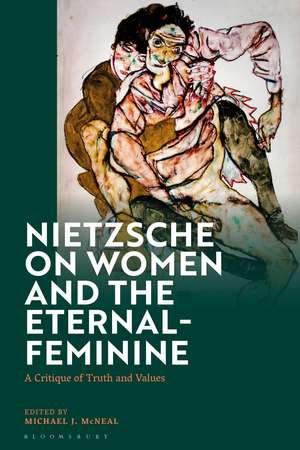Nietzsche on Women and the Eternal-Feminine: A Critique of Truth and Values
Editat de Michael J. McNealen Limba Engleză Hardback – 23 aug 2023
Preț: 511.31 lei
Preț vechi: 731.73 lei
-30% Nou
Puncte Express: 767
Preț estimativ în valută:
97.87€ • 106.34$ • 82.26£
97.87€ • 106.34$ • 82.26£
Carte tipărită la comandă
Livrare economică 21 aprilie-05 mai
Livrare express 14-20 martie pentru 120.44 lei
Preluare comenzi: 021 569.72.76
Specificații
ISBN-13: 9781350345287
ISBN-10: 1350345288
Pagini: 272
Dimensiuni: 156 x 234 x 23 mm
Greutate: 0.55 kg
Editura: Bloomsbury Publishing
Colecția Bloomsbury Academic
Locul publicării:London, United Kingdom
ISBN-10: 1350345288
Pagini: 272
Dimensiuni: 156 x 234 x 23 mm
Greutate: 0.55 kg
Editura: Bloomsbury Publishing
Colecția Bloomsbury Academic
Locul publicării:London, United Kingdom
Caracteristici
Covers a diverse range of subjects on Nietzsche and women including goddess spirituality, drag, marriage, and mythology
Notă biografică
Michael J. McNeal is Adjunct Professor of Philosophy and International Relations at the University of Denver, USA.
Cuprins
Introduction by Michael McNeal Part I. Formative Antecedents 1. Nietzsche on Woman (with a new postscript), Lawrence J. Hatab, Old Dominion University (1981)2. Woman as Truth in Nietzsche's Writing, Kelly Oliver, Vanderbilt University (1984) Part II. Perfectionism and Psychology 3. Nature's Motherly Veil - Style in Nietzsche's Untimely Meditations, Pedro Nagem de Souza, UNICAMP, Brazil 4. Nietzsche and the Psychology of the 'Eternally Feminine', Allison Merrick, California State University, USA 5. Nietzsche's Perfectionism and the Ethics of Care, Justin Remhof, Old Dominion University, USA Part III. Women, Myth, and the Future 6. Shakti Under Erasure: Parallels with Goddess Spirituality in Nietzsche's Thought, Shruti Jain, Jindal Global University, India 7. The Meaning of Ariadne for Nietzsche, Mat Messerschmidt, University of Chicago, USA 8. Nietzsche on Naxos: Seduction, Deification, and the Truth of the Self, Nicholas Low, Harvard University, USA Part IV. Gender, Ressentiment, and the Revaluation of Values 9. Genealogy in Drag: Nietzsche and Butler on Language and Gender, Marta Vero, Italian Institute for Germanic Studies, Italy 10. What if Truth Were a Woman? Metaphors of the Feminine and the Transvaluation of Values in Nietzsche's Philosophy, Isadora Petry, UNICAMP, Brazil 11. Feminism as Female Slave Morality? An Emancipatory Thesis from Rousseau to Nietzsche, Nina Lex, Friedrich Nietzsche College, Germany12. Nietzsche on Marriage and the Cultivation of Humanity, Marina García-Granero, University of Valencia, Spain Part V. Nietzschean Engagements and Influences 13. The 'Eternal-Feminine' in Nietzsche's Philosophy: On Nietzsche's Inversion of Goethe's Verse - Ihr 'Ewig-Weibliches' zieht uns - hinab!, Vinicius Souza de Paulo, Federal University of São Paulo, Brazil 14. The Nihilism of the Oppressed: Hedwig Dohm's Feminist Critique of Nietzschean Nihilism, Katie Brennan, Temple University, USA15. Stendhal, Nietzsche, and Beauvoir on Romantic Love, Lorenzo Serini, University of Warwick, UK Index
Recenzii
Like Goethe's expression 'the Eternal-Feminine', Nietzsche's status as a feminist thinker has been perceived as regressive and progressive alike. Michael J. McNeal brings together a thought-provoking set of essays that interrogate the role of the feminine in Nietzsche's thought in a way that directly addresses our contemporary debate about gender and identity.
However controversial Nietzsche's views on the 'feminine' might be, few can deny his importance in identifying sexual difference as a philosophical issue. In this wide-ranging, highly stimulating collection of essays, the importance of Nietzsche as a thinker of the feminine is newly foregrounded and newly invigorated for our times.
However controversial Nietzsche's views on the 'feminine' might be, few can deny his importance in identifying sexual difference as a philosophical issue. In this wide-ranging, highly stimulating collection of essays, the importance of Nietzsche as a thinker of the feminine is newly foregrounded and newly invigorated for our times.
